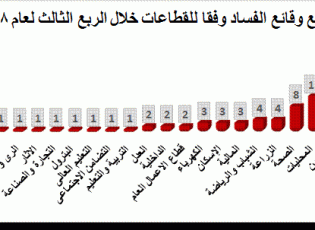High-level expert meeting
Towards drafting a legislative agenda to combat corruption in light of Egypt's 2030 strategy ... ideas and visions.
the report Final
Partners for Transparency held a high-level expert meeting entitled “Towards formulating a legislative agenda to combat corruption in light of Egypt's 2030 strategy… ideas and visions” on the cruise ship Nile Smart Maadi Corniche from 5 pm to 7 pm on Wednesday 14 December 2016.
Participants and speakers
- Majdi Malek Maximus: Member of Parliament from Minya Governorate
- Manal Maher Al-Jamil: Member of Parliament
- Muhammad Abdullah Zain: Member of Parliament
- Ayman Akil: President of the Maat Foundation for Peace, Development and Human Rights.
- Saeed Abdel-Hafez: President of the Dialogue Forum Foundation
- Hani Ibrahim: President of the Mashreq Foundation for Development and Population
- Yasser Abdel-Gawad: Lawyer and Director of the Arab Law Office
- Hussein Metwally: Journalist specializing in corruption cases
- Abdel Nasser Kandil: Parliamentary Analyst and Secretary of Parliamentary Affairs in the Tagammu Party
- Shehata Mohamed Shehata: lawyer of cassation and director of the Arab Center for Transparency and Integrity
- Walaa Jad Al-Karim: General Director of the Partners Foundation for Transparency.
The proceedings of the session
The session began at exactly 5:30 pm with the speech of Dr. Walaa Jad Al-Karim, Director General of the Foundation, about the vision and mission of the Foundation and its previous activities. He reviewed its main publication entitled "Corruption Status Book", which is issued monthly since July 2015 until now. He also reviewed the Foundation's experience in monitoring electoral financing and spending in some departments. Electoral elections in the 2015 Egyptian Parliament elections.
The Director General of the Foundation said that the meeting is gaining increasing importance in light of the continuous demands of civil society organizations for the need to develop the legal and institutional environment to combat corruption and achieve the goals of the Egypt 2030 strategy, and to support the efforts already made by some oversight institutions and parliamentary mechanisms, as well as the translation of political discourse that focuses on combating corruption Corruption is based on specific procedures and practices based on an adequate and deterrent set of laws. However, the parliamentary agenda is burdened with a huge set of legislations that are required to be fulfilled in fulfillment of constitutional entitlements and urgent developmental needs. Therefore, providing a platform for continuous and effective dialogue between civil society and parliament can lead to pushing for legislation Fighting corruption is a priority in arranging the parliamentary agenda during the next phase.
Interventions of civil society representatives
Representatives of civil society organizations, analysts, and participating journalists presented their vision first, which focused on their assessment of the legislative environment to combat corruption and the priorities that they deem necessary to be placed on the priorities of the legislative activity of Parliament during the next phase, and the most important interventions were as follows: -
Abdel Nasser Qandil
Egyptian society after two waves of social mobility suffers from corruption, and he cited some incidents, such as the case of the former Minister of Agriculture, the incident of the Minister of Health advisor, and the incident of the director of security for the Giza Governorate building.
And he added: Administrative corruption wastes a quarter of the state’s general budget, and on the other hand, officials ’actions are very slow in facing this file.
As for the legislative side, there is no clear legislative agenda, and none of its items were announced, whether in the plenary sessions or the qualitative committee meetings, throughout the first session, and he also indicated that the priorities that he proposes are the law regulating the circulation of information and the establishment of the National Anti-Corruption Commission.
Mr. Hussein Metwally
He referred to the efforts of the Transparency and Integrity Support Committee that was in place before January 25, 2011, and said that the reports published by the committee showed that there is a crisis at the level of legislation necessary to combat corruption, and he also focused on the concept of "corruption of whales and not corruption of young children", noting corruption Related to state lands, seizing them and changing activity, he stated that this file, if resolved, would return billions to the state treasury.
With regard to the priority of the legislation to be reviewed, I think that it is represented in a package of legislations related to reconciliation in public money issues and the articles of the penal code related to combating corruption and the graft law.
Ayman Aqeel
In his intervention, he emphasized that there are a set of recommendations that the Egyptian government accepted during its submission to the universal periodic review in March 2015, including 7 recommendations related to combating corruption and developing relevant legislation with the aim of enhancing citizens' opportunities to access their economic and social rights.
With regard to the legislation and laws that need to be placed on the priority of the legislative agenda, he has defined them in the laws of tenders and auctions, the civil service law, and the regulation of information circulation, and he also mentioned that there is an urgent need for a national anti-corruption commission. And he ended his statement that Egypt will be compelled in March 2019 to answer the extent of its commitment to the recommendations that it has agreed upon, and that must be prepared for.
Hani Ibrahim.
He started his speech by thanking the MPs for their contact with civil society, and said that there is a crisis between the citizen and the state, and there is a deficit general budget. And the government is trying to fill this deficit by increasing revenues by imposing taxes and others, and these matters have become difficult, especially after floating the pound.
And he went on to say: In order for the citizen to feel the benefit of fighting corruption that we are talking about, we must move away from cheering individual cases of fighting - even if they are important - but the citizen is interested in cases that touch him directly, as if the neighborhood does not pave the road 10 times for strange things!
And move on to talk about the concept of perception. He said that if there is an honest citizen who does not seize state funds and is not corrupt, but he is in the whole system of corruption, according to a previous study, the ability of this citizen to continue without corruption is only 30 days. All of this is due to the behavioral perception, as the citizen gets used to corruption until it becomes a part of it. But his sense that the state has more oversight agencies to monitor corruption will affect his perception and thus his behavior.
He said that today's meeting, which links the sustainable development strategy and the fight against corruption, is very wonderful, but we fear that the goals we want to achieve cannot be achieved due to lack of time.
If we put indicators to combat corruption, then we must follow them so that they are useful. The important thing is for the citizen to feel in the end that the government serves him and the parliament serves him.
Saeed Abdul Hafiz:
He began by saying that fighting corruption requires political will, but it also needs popular will. We work on corruption in a very narrow area, through monitoring, documentation, agreements and press, but this is not what is required. We want other mechanisms, because this is not enough, and he continued his statement that civil society is the son of the country in which he lives, and if we do not make efforts to combat corruption, this country will hold us accountable.
He pointed out that the national strategy to combat corruption is based mainly on the role of civil society, of which a large part has not been achieved by either the government or civil society.
He mentioned that we want to work vertically, meaning the government asks civil society to help it and Parliament in the fight against corruption. He concluded his speech by asking, “Why did the parliament not call the committee based on the strategy to hold it accountable for what has happened so far?
Yasser Abdel-Gawad
He began his intervention by saying, “We need a legislative agenda with legislative priorities to combat corruption. We not only want to know how many cases were seized, but we want legislation and mechanisms.
With regard to legislative priorities, he said we want special legislation to protect witnesses and whistleblowers (protection of the whistleblower). And the law on freedom of information is like the proposal prepared by the government, and in response to the question posed by the Representative / Manal Gemayel about the ceiling of circulation, he said: “The principle is availability and the exception is blocking.” .
With regard to the mechanisms, he emphasized that there are governmental mechanisms such as the existing ones, and popular mechanisms headed by parliament and civil society, but the system lacks national mechanisms such as the National Anti-Corruption Commission.
He mentioned that Egypt has ratified the United Nations Convention against Corruption, which provides for a preventive approach to corruption, legislation that prevents it, and mechanisms for punishment after it occurs. There are many laws that contradict this agreement, such as the Law on Appeal against State Contracts and the Law on Reconciliation in Public Fund Cases issued in 2012.
Shehata Mohamed Shehata
He started by saying that we want to put ourselves at the beginning of the road to realize how to start. Egypt ratified the Anti-Corruption Convention in 2005, and in return we did not take any of the preventive measures in accordance with it. A national anti-corruption commission has not been established, whose role is preventive and not punitive, as its mission is to propose draft laws and set standards in the government to provide services without suspicions of corruption, but it will not monitor phones and will not rule in cases, and he indicated that some agencies opposed the idea of establishing the commission, thinking that its role would interfere with The role of these devices.
Speaking about the National Anti-Corruption Strategy, he said: It is a failure, because it has no body responsible for follow-up and implementation, and the Integrity Committee did not continue, considering that the legislative priority is to establish an independent national commission.
Interventions of members of the House of Representatives
Representative: Manal Maher
She thanked the attendees and began by commenting on their words, saying: The National Anti-Corruption Strategy is currently being discussed, and they are also discussing the periodic report prepared by the Human Rights Council in this regard.
I also mentioned that there is a desire from the government to create a mechanism with regard to the cost of spending, to work according to standard spending to prevent unjustified spending, and this indicates the government's desire and thinking about the anti-corruption file.
In the context of talking about the 2030 sustainable development strategy, I mentioned that its combined indicators are currently being divided into annual indicators so that they can be followed up through Parliament.
She added that there are many laws currently on the table as proposals for draft laws, such as the Law on Protection of Witnesses and Whistleblowers, and the National Anti-Corruption Commission. She concluded that the council’s agenda was focused on working on laws that complement the constitution, which must be completed first, as well as the internal regulations, indicating that the focus on these laws will continue until the end of the second session, which means postponing consideration of anti-corruption files to the third session.
And she added, we are all trying to fight corruption, and we are all working in parallel. And she said that there is a legislative agenda that serves the 2030 sustainable development strategy. We do not want to anticipate matters or judge anyone's intentions, but we want discussion and dialogue and we want to wait for an agenda. Stressing the need to work in advance on the value system in the Egyptian society in order to be able to confront better.
MP Muhammad Abdullah Zainuddin
He began by making sure that we all agree on our desire for an Egyptian state that has justice, integrity and transparency. From this standpoint, we suffer from corruption, ignorance and disease.
And I go on to say that the parliament in its first session was burdened with worries, and that the state in its executive authority issued all these worries and problems to the House of Representatives.
He also stressed the need to confront corruption, starting with the localities where there are many incidents of unparalleled corruption. And that this corruption will not be ceased until God inherits the earth and those on it, but we are working to make the corruption much less than what it is now.
And he continued his words, that there was chaos after the revolution of the twenty-fifth of January 2011, and there was a yearning for the people to solve their problems in one month, to the point that the citizens began to count their share of the money that would be recovered from the corrupt!
And he said that discipline does not come with an abundance of legislation, but that the law is a real obstacle, and the question here is: Are the existing laws - with their flaws - exploited ?!
Then he summarized the discussion of the bill that was submitted in the first session, withdrew it to make some amendments to it, and then resubmitted it again in the second session. He said that this project focuses on establishing an anti-corruption agency that has a legal personality in accountability, and works on the basis of the principles of transparency and integrity in the statements and reports issued by it that describe the cases and incidents of corruption it finds in the various state institutions.
And he responded to many calls for the need to involve civil society, that even civil society has corruption, and from here we want strong foundations based on values and morals that must be restored and confirmed once again by this people. And he concluded by saying that young people have lost confidence in all persons in all institutions, and this is what must be worked on in order to restore these values and infuse them into this youth, who will assume the role of promoting these national institutions later.
MP Magdy Malak
After greeting the attendees, MP Magdy Malak, head of the recent wheat corruption investigation committee, said that there is really a big crisis in the existing legislation, and perhaps this legislation is the main cause of corruption. In addition, a minister issues decisions that lead to manipulation, corruption and escape from responsibility, and this is the executive aspect of these legislation, which must be amended.
He continued by saying that there was a disintegration of society beginning in the period after 1952, after which a big door to corruption was opened. And I continue that corruption in the state has become stronger than people And he emphasized that there are many honest people in the state’s administrative apparatus, but they are like a point in the sea. And he said that the state's general budget drains about 40% in administrative corruption, which is something worth examining.
And he indicated that the President wants us to help him in this matter. And after that the state’s supervisory apparatus has some defect, the administrative control apparatus is stronger than the central auditing agency and exerts a much greater effort.
And I continue his words with an anecdote about a Palestinian investor who wanted to attract him to work inside Egypt, but the institutional bureaucracy that prevented him from doing so, indicating that this is a kind of administrative corruption. And he concluded that the current committee headed by the advisor of the President of the Republic Ibrahim Mehleb to recover the state's lands could generate 970 billion pounds for the state, which is something that should be focused on as an effort from the state’s efforts in combating corruption.
Final summary and recommendations
The participants expressed the importance of the meeting because it provides an opportunity for direct communication between representatives of civil society organizations and members of parliament, and they agreed that there is already a big crisis in the current legislation, and perhaps these legislations are the main cause of corruption, decline in development rates and the complexity of the investment environment, and there is an urgent need To fill the current legislative void by expediting the adoption of the two laws on information circulation and the protection of whistleblowers and witnesses, and at the same time making radical amendments to the articles of the penal code related to waste of public money and bribery, as well as completing the system of anti-corruption mechanisms by establishing an independent national body, and finally focusing on The file of recovering the state’s lands for what it might provide in terms of huge revenues for the state’s general budget.
The participating parliamentarians and leaders of civil work confirmed the Partners for Transparency’s request to organize another series of dialogue sessions between members of Parliament and civil society in the context of the same issue.










